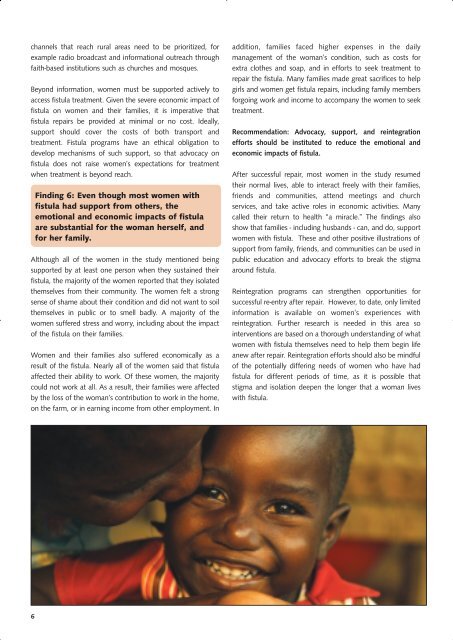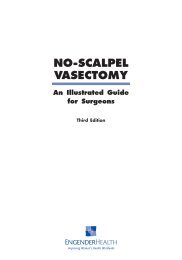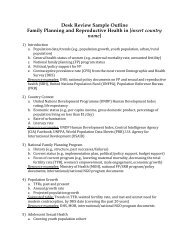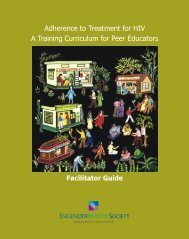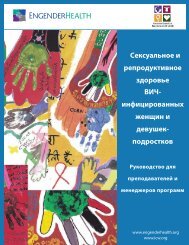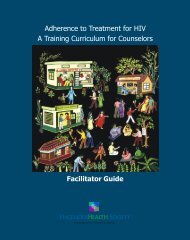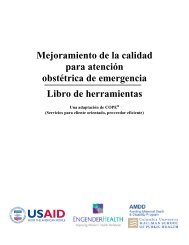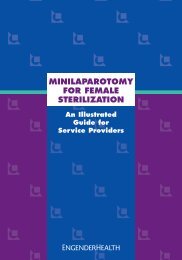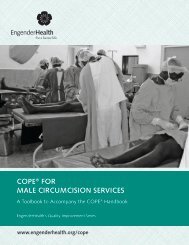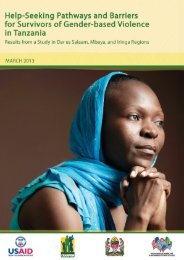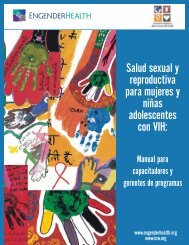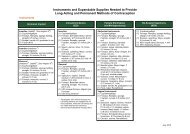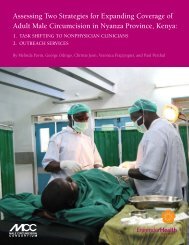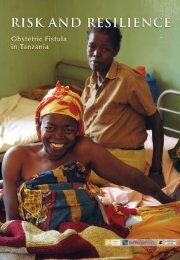Obstetric fistula in tanzania - EngenderHealth
Obstetric fistula in tanzania - EngenderHealth
Obstetric fistula in tanzania - EngenderHealth
You also want an ePaper? Increase the reach of your titles
YUMPU automatically turns print PDFs into web optimized ePapers that Google loves.
channels that reach rural areas need to be prioritized, forexample radio broadcast and <strong>in</strong>formational outreach throughfaith-based <strong>in</strong>stitutions such as churches and mosques.Beyond <strong>in</strong>formation, women must be supported actively toaccess <strong>fistula</strong> treatment. Given the severe economic impact of<strong>fistula</strong> on women and their families, it is imperative that<strong>fistula</strong> repairs be provided at m<strong>in</strong>imal or no cost. Ideally,support should cover the costs of both transport andtreatment. Fistula programs have an ethical obligation todevelop mechanisms of such support, so that advocacy on<strong>fistula</strong> does not raise women’s expectations for treatmentwhen treatment is beyond reach.F<strong>in</strong>d<strong>in</strong>g 6: Even though most women with<strong>fistula</strong> had support from others, theemotional and economic impacts of <strong>fistula</strong>are substantial for the woman herself, andfor her family.Although all of the women <strong>in</strong> the study mentioned be<strong>in</strong>gsupported by at least one person when they susta<strong>in</strong>ed their<strong>fistula</strong>, the majority of the women reported that they isolatedthemselves from their community. The women felt a strongsense of shame about their condition and did not want to soilthemselves <strong>in</strong> public or to smell badly. A majority of thewomen suffered stress and worry, <strong>in</strong>clud<strong>in</strong>g about the impactof the <strong>fistula</strong> on their families.Women and their families also suffered economically as aresult of the <strong>fistula</strong>. Nearly all of the women said that <strong>fistula</strong>affected their ability to work. Of these women, the majoritycould not work at all. As a result, their families were affectedby the loss of the woman’s contribution to work <strong>in</strong> the home,on the farm, or <strong>in</strong> earn<strong>in</strong>g <strong>in</strong>come from other employment. Inaddition, families faced higher expenses <strong>in</strong> the dailymanagement of the woman’s condition, such as costs forextra clothes and soap, and <strong>in</strong> efforts to seek treatment torepair the <strong>fistula</strong>. Many families made great sacrifices to helpgirls and women get <strong>fistula</strong> repairs, <strong>in</strong>clud<strong>in</strong>g family membersforgo<strong>in</strong>g work and <strong>in</strong>come to accompany the women to seektreatment.Recommendation: Advocacy, support, and re<strong>in</strong>tegrationefforts should be <strong>in</strong>stituted to reduce the emotional andeconomic impacts of <strong>fistula</strong>.After successful repair, most women <strong>in</strong> the study resumedtheir normal lives, able to <strong>in</strong>teract freely with their families,friends and communities, attend meet<strong>in</strong>gs and churchservices, and take active roles <strong>in</strong> economic activities. Manycalled their return to health “a miracle.” The f<strong>in</strong>d<strong>in</strong>gs alsoshow that families - <strong>in</strong>clud<strong>in</strong>g husbands - can, and do, supportwomen with <strong>fistula</strong>. These and other positive illustrations ofsupport from family, friends, and communities can be used <strong>in</strong>public education and advocacy efforts to break the stigmaaround <strong>fistula</strong>.Re<strong>in</strong>tegration programs can strengthen opportunities forsuccessful re-entry after repair. However, to date, only limited<strong>in</strong>formation is available on women’s experiences withre<strong>in</strong>tegration. Further research is needed <strong>in</strong> this area so<strong>in</strong>terventions are based on a thorough understand<strong>in</strong>g of whatwomen with <strong>fistula</strong> themselves need to help them beg<strong>in</strong> lifeanew after repair. Re<strong>in</strong>tegration efforts should also be m<strong>in</strong>dfulof the potentially differ<strong>in</strong>g needs of women who have had<strong>fistula</strong> for different periods of time, as it is possible thatstigma and isolation deepen the longer that a woman liveswith <strong>fistula</strong>.6


